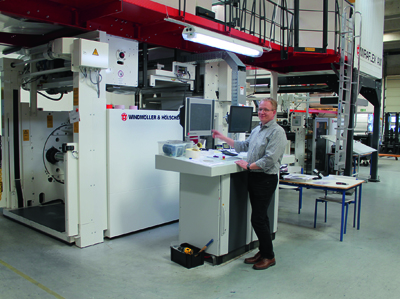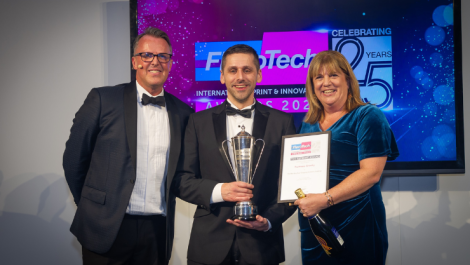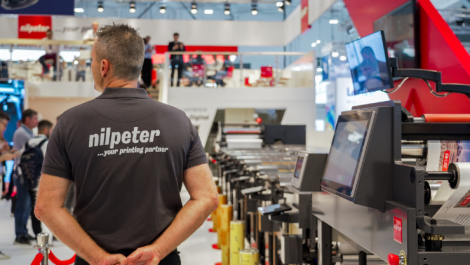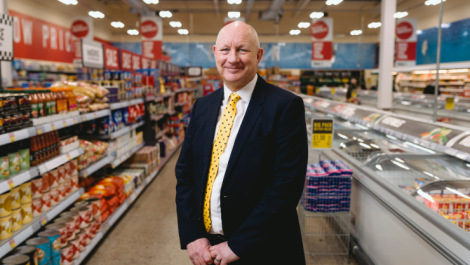Founder of ScanMould, Martin Fundal opted to invest in flexo for his IML business
Danish company ScanKet has a long history of innovation. Most recently the pioneer has set up a new business specialising in in-mould labels printed on a wide web flexo press. Neel Madsen visited the new ScanMould operation.
When Martin Fundal took over at ScanKet A/S in Birkerød, located north-west of Copenhagen, in 2004, the label printing company was already a pioneer in both flexo and digital. Since the company was established in the mid-1980s, it has been at the forefront of development, implementing new technologies and applications, something that appealed to Mr Fundal. He said, ‘I already knew ScanKet really well, having been their supplier of digital presses for a number of years, so I didn’t need to think twice when the offer came. I have always had an innovative streak in me, so I jumped at the chance to take the reins at one of Scandinavia’s most progressive printing companies.’
New application
ScanKet first started to develop in-mould labels (IML) in cooperation with rigid plastic packaging specialist RPC Superfos for fish products, and the company continues to produce this type of labels on its narrow web flexo presses. However, five or six years ago, the idea to take the business to a higher level and exploit this niche market started to take hold.
While this sector is still very small in Denmark and Scandinavia in general, accounting for just 1% of the market, Mr Fundal had a vision. He said, ‘It was obvious to me that the potential for growth in this sector is huge, but I understood quickly that to make a profit, we needed to think big and scale this production up to produce longer runs.’ So, in 2015, he branched out and set up shop in Jyllinge, north of Roskilde, in a dedicated production facility, solely focused on IML.
A very ambitious project, ScanMould is a completely new venture with funding from amongst others the Danish Growth Fund, which is a state investment fund that contributes to the creation of new companies. Mr Fundal took on the role as managing director supported by an old friend from his student days, Martin Colberg, who came onboard as sales and marketing director.
Using flexo
For longer runs, Mr Fundal was a firm believer that flexo technology would be the right choice rather than offset, both in terms of quality and cost efficiency, so the company invested in a 1300mm-wide Windmöller & Hölscher Miraflex AM flexo press as the centre of the operation. Standing in one of two halls at the 1500sqm modern facility, the press prints in up to eight colours at speeds up to 400m/min, and is fitted with anilox rollers from Sandon and Flint’s rotec sleeves, while the printing plates are supplied by Reproflex Scandinavia – a specialist in Kodak Flexcel NX technology.
The press is complemented in the adjoining hall by a complete finishing set up consisting of a KBA Rapida RDC 106 rotary die-cutter, a Kawahara TXR-1100 blanking machine and a Prati Alhena IML converting machine. The factory also houses a suite of machines from FlexoWash for cleaning the equipment and a JM Heaford Cobra 1300 DX plate mounter.
In combination with the flexo capacity at ScanKet, which includes two MPS presses – an EC press and an EF Advanced multi-substrate model with APC automation package (both 410mmm wide) – and its digital department, which has two HP Indigo WS6800 presses both running inline with an ABG Digicon, it is clear that Mr Fundal and his team can produce any size and any length of IML jobs. The challenge now is just to educate the market.
‘We are the first dedicated IML label manufacturer in Scandinavia and our aim is to become a player on the European market and beyond,’ said Mr Fundal. ‘IML is a very challenging application and it has been a steep learning curve, but we now have a set up that offers much faster delivery and a lower price than traditional production.’ He concluded, ‘The advantage of IML is that you remove the whole handling of labels with all the associated issues and I see a great potential for it to take away shares from self-adhesive labels.’






